All about the upbringing and re-education of cats
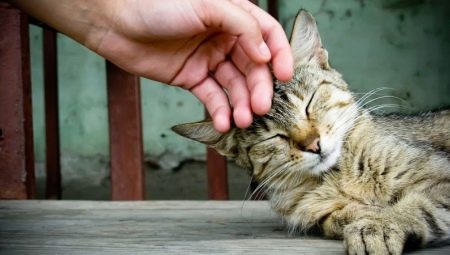
The upbringing of cats is a mandatory stage in their growth and development. Otherwise, the pet may grow up aggressive, causing inconvenience to all household members. Like a child, he requires attention, and in his absence he feels unnecessary, which manifests itself in anger and arbitrariness. The material in this article will help the reader understand when and how to engage in the educational process with your pet.

Optimal age
A cat is considered a modest animal; under certain conditions, it quickly gets used to the rules established in a particular house. Her upbringing begins from early childhood, and the mother cat begins to do this. From birth to two months of age, kittens under the care of a cat learn to build relationships and communicate with each other. This is how basic socialization proceeds.
Kittens are removed from the cat at about 2 months. By this time, they have already passed the first basics of communication, resolving conflict situations, and acquire tactics of behavior. Around this time, you can start raising pets.
The first step is to reduce the stress associated with weaning and moving to a new home.


Other kittens are given by breeders only at three months, accompanied by documentation, which includes a veterinary certificate and pedigree. As a rule, these babies are already litter-trained and vaccinated. After the pet has more or less moved away from parting with its mother, you can start raising it. Particular attention should be paid to its security and the creation of borders.
By the age of four months, the baby will understand the diet, he will understand the time of wakefulness. If you miss this moment, it will be more difficult to raise an affectionate and calm pet. If you shift the upbringing procedure from day to day, you can wait for the pet to start marking territory in six months.
It's easy to understand that the baby is ready: as soon as he stops yearning for his mother, it's time to act.


rules
You should not indulge all the whims of a pet, so as not to raise a naughty cat or an uncontrollable cat. Any home should have rules from feeding to personal space. The pet should not be allowed aggressive games, scratching, biting the owners. You cannot ignore the animal, because by itself it will not become smart and well-mannered.
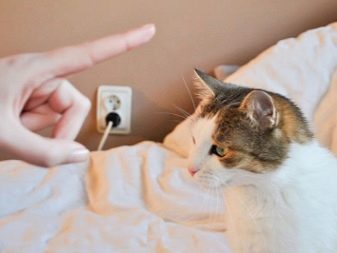

Within six months after the kitten is brought home, it is important to create a calm environment for him so that he can relax and feel safe. Stressful situations are excluded in the form of:
- noisy get-togethers with friends;
- loud music, especially metal or rock;
- walks around the house on a leash;
- screaming, sudden movements, aggression in the tone of voice;
- gazing, touching the base of the tail and belly;
- punishments that offend the animal.

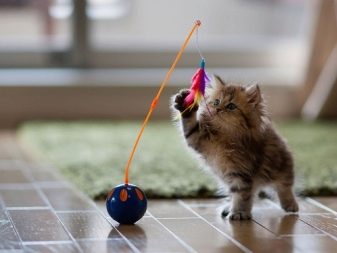
There are 10 basic rules to take note of.
- The feeding time is sacred: it is necessary to withstand certain hours and the frequency of feeding.
- You should never scare a kitten or an adult cat while sleeping.
- You cannot start aggressive games with the kitten, deliberately make him angry, or forcibly hold him by the tail or paws.
- You cannot shout at the pet, because he understands the intonation of the owner very well.
- From the first day, it is important to equip the kitten with its own space. He should have his own bed and toys. He should not sleep in the owner's bed.
- Every day you need to talk to your pet, stroke it, caress it. However, you cannot crawl to the baby with your love if he is busy with something.
- You can't yell at your baby when bathing, even if he is very scared and scratches. You cannot deliberately frighten him with the loud noise of a switched on vacuum cleaner.
- You cannot beat the animal, forcing it to stand or sit as you wish.
- It is important to ensure that your cat has access to his litter box, bed, and bowl.
- In addition to food, the pet should always have a bowl of water; he should not look for water himself in the sink, toilet or sink.


It is important in the first month after the kitten adapts to new conditions, to start hygiene of the ears, hair and eyes. This should become a habit, as should a visit to the veterinarian for preventive examinations.
If you teach your baby not to be afraid of anything from early childhood, he will behave calmly and friendly.
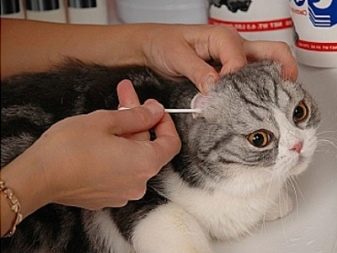
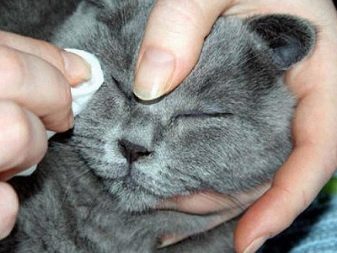
How to train to the tray?
It is not uncommon for kittens to be held in their arms when they need to go to the toilet. Situations end in minor annoyances. At the same time, the kids feel discomfort and in the future they try to hide from annoying household members. It is not difficult to train a kitten to a litter box at home. As soon as the baby starts to fuss and hiccup the toilet, it is necessary to transfer it to the tray.
To make the kitten more understandable, you can pick up a tray similar to the one in the cattery by purchasing a similar filler. As a rule, small kittens go to the toilet about 15-20 minutes after eating. This is the best time to keep an eye on them.
If suddenly the baby did not have time to find his tray, trouble has occurred, you should not poke his nose or scold him.


This behavior of the owner will scare the animal. The kid will think that this should not be done in the house. And since he cannot endure forever, he will hide. Puddle or excrement should be collected with a napkin and placed in the tray. After that, the kitten itself should be put in the tray with its paws so that it smells and understands where the latrine is.
The place where the "surprise" happened it is necessary to thoroughly rinse and treat with "Antigadin"... If this is not done, you can expect repeated troubles in the same place.First, the tray is placed near the baby. As he grows up and gets better at home, the tray is moved to a permanent place.
You can and should tell your pet that he did a bad thing, because cats perfectly understand intonation.
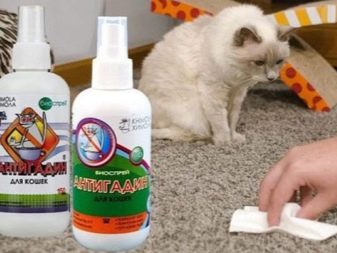

Scratching post training
Surely, many are familiar with the situation when cats destroy with their claws not only upholstery of upholstered furniture, but also wallpaper and even clothes. To prevent this, it is necessary to purchase a special device for a small kitten, called a scratching post. There is no need to grab the kitten and scratch its paws on the device: it is often enough to play nearby, and for this the scratching post can be part of the play complex. The kitten should have a scratching post by 5-6 months.
To help keep a bad habit from taking hold, you can buy a few gadgets by placing them at the front door and in the areas where the kitten spends most of its waking hours.
To attract attention, you can spray them with valerian or mint scent. Cats are usually partial to these plants.

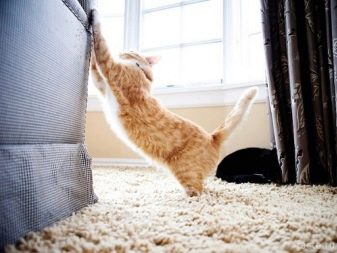
Communication and food
Pay attention to a kitten, and an adult cat needs to be paid every day. This can be joint walks in the fresh air, games, conversations. As a rule, it is individuals devoid of human affection that snort and hiss more often than others. Self-confident animals are calm. You can take the baby in your arms when he allows it, but this is rarely absolutely impossible.
If the baby is asleep, do not touch him: this deprives the cat of a sense of security in its own bed. Therefore, he will hide in order to calmly rest. For a kitten to grow up affectionate, communication with him should be similar. This is taking care of a child, feeding, restful sleep and active games, encouragement in exploring the world and no stressful situations.
In addition, nutrition also affects his condition. To prevent anxiety, you need to properly feed your baby, choosing a nutritious diet based on his age. In addition to industrial feed, he must have natural food, and fresh.
The behavior will largely depend on whether the cat's body will receive enough vitamins and nutrients.


Can you beat a kitten?
Under no circumstances should an animal be beaten, whatever its age, for the purpose of education. This leads to his anger, and sometimes revenge. Forceful methods will never lead to the animal becoming obedient and affectionate. A small kitten will grow up shy and nervous, he will be afraid of his owner.
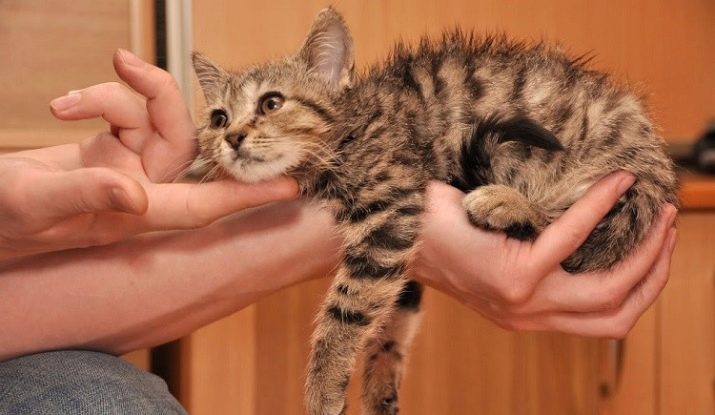
How to re-educate an adult cat?
Achieving good behavior from a bad-behaving cat will not work. The tone of communication with a guilty and disobedient animal can be strict, but not in any way irritated or aggressive.


Let's point out several main problems and ways to solve them.
- To prevent the cat from biting during the game, the bitten finger can be pushed a little deeper. The animal will well remember the uncomfortable sensations and quickly understand that it is not necessary to repeat this.
- If the cat constantly knocks over something, put coins in these containers. When the container falls, there will be a loud sound that pets do not like, a couple of times will be enough for the cat not to climb into this place anymore.
- Cats don't break dishes especially during wild races. Like a mother cat, you can, but not for long, scold a cat by touching the tip of his nose (this is how the mother cat “scolds” babies).
- You should not scold the cat for a whole week for any offense. He quickly forgets why. You can't go to screaming.
- To prevent the cat from jumping where it is impossible, stick sticky tape on these places for a while. She really does not like it, besides, she remembers the places where it is not worth conquering the “peaks of the house”.
- If the cat steals food, it's your fault. Remove it immediately after a meal, wash the dishes, hide the leftovers in the refrigerator. You need to feed the cat before your meal.
- To prevent the cat from jumping over your clothes, generously endowing it with its fur, use sprays based on plant ingredients. Cats do not like many smells and do not climb where they come from.
- If the animal is not indifferent to houseplants and overturns them along with the ground, it is worth diluting black pepper in water and sprinkling the plant on them.
- For good behavior, you can reward your pet with treats or praise.
- So that the cat does not spoil in the house in the wrong places, it should not be tame. In addition, children should not be allowed to offend him; an animal should not be tortured.


Possible difficulties
Cats understand the closeness of a relationship. So that the animal does not feel lonely and unnecessary, it is necessary to play with him from childhood, finding for this 15 minutes in the morning and in the evening. In this case, it is advisable to ensure that the time of the game from day to day takes place at the same time. This will accustom the kitten to a certain routine when it can ask for attention.
Do not play with an animal using hands or feet instead of toys. You cannot tease an animal, considering it harmless games: it is these “methods of upbringing” that turn a kind and intelligent kitten into an evil and aggressive one. Neither pulling the wool nor pinching it is allowed: this is painful, and therefore the animal can respond in kind.
If the game becomes aggressive, it must be stopped by moving the pet to another room and allowing it to calm down. If it does not reach him right away, then over time this measure will take effect. Do not allow your cat to think that this behavior is worthy of reward and at least some attention. Take your pet to another room and make a remark in a stern voice.


When cats are partial to curtains (for example, they spoil them, gnaw and tear with their claws), you can try spraying the pets with water from a small spray bottle. This helps other individuals: henceforth they try not to repeat this. If the animal has made it a rule to mark the territory, the places of the marks should be treated with a solution of essential oil with citrus. In most cases, this discourages such a hunt.
There are times when the cat does not recognize the authority of the owner. This is explained by the fact that since childhood, the baby slept with a person in the same bed. It is in the bed that a large concentration of smell accumulates, and therefore, from childhood, the kitten considers itself to be an equal to the owner. With age, he may consider himself the dominant member of the family or its leader. Re-educating such cats is difficult, and sometimes even impossible.
So that he does not spoil in different places, the tray must be cleaned every time the animal visits it (it is especially important to immediately get rid of excrement). You cannot push the cat away with your foot if it is spinning nearby, you cannot scold him for what he is not guilty of. The reason for the cry should never be the owner's bad mood. Train your cat to take care, and over time he will learn to feel sorry for you, purring nearby and soothing by rubbing his faces on his cheek or hands.


You can learn how to wean a cat from tearing up a sofa and wallpaper by watching the video below.
































